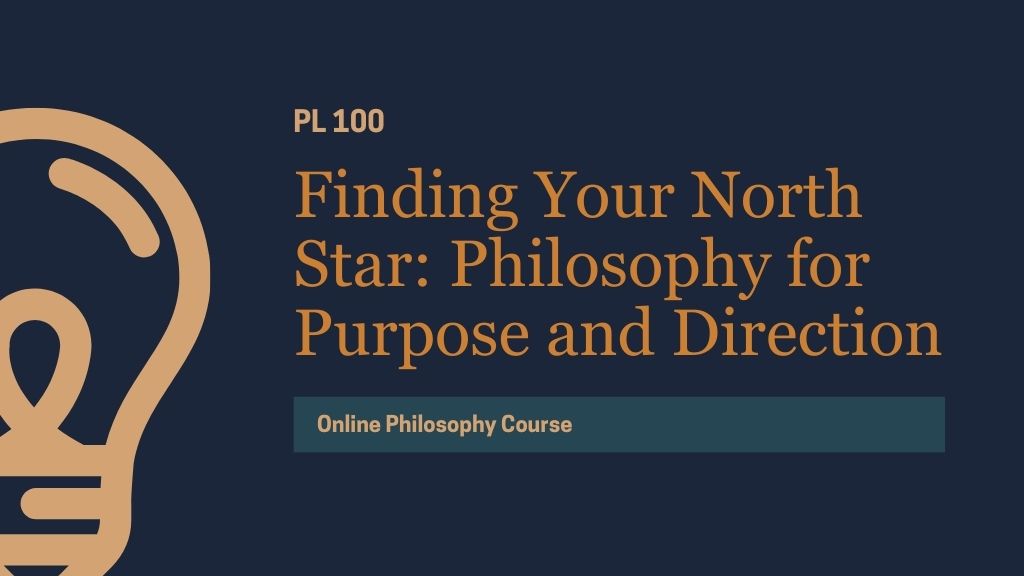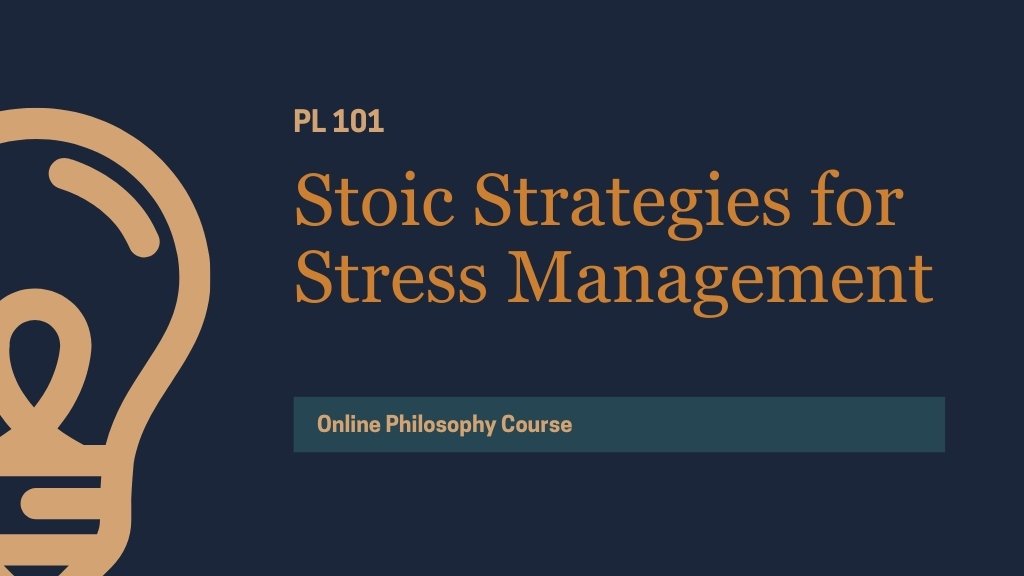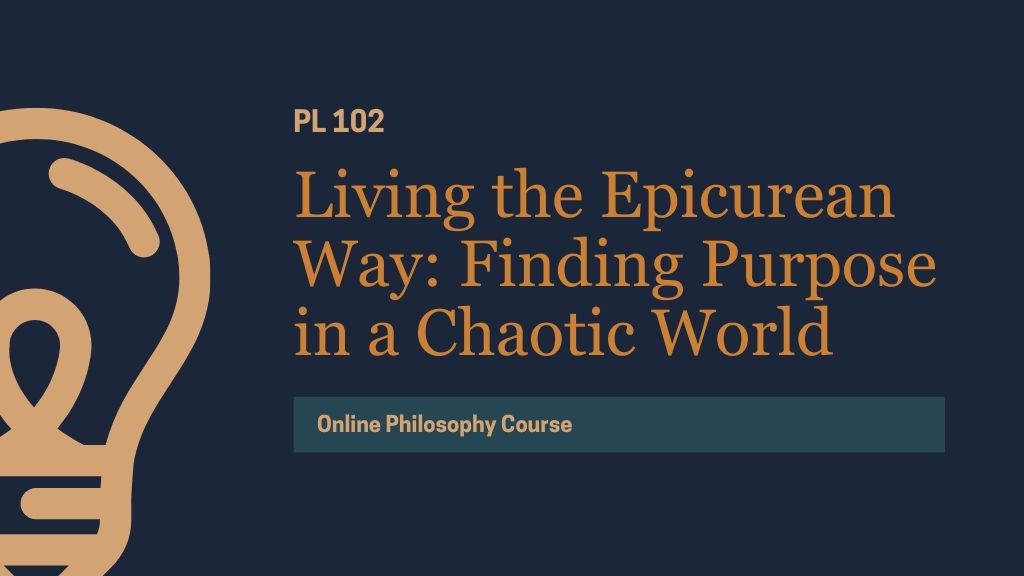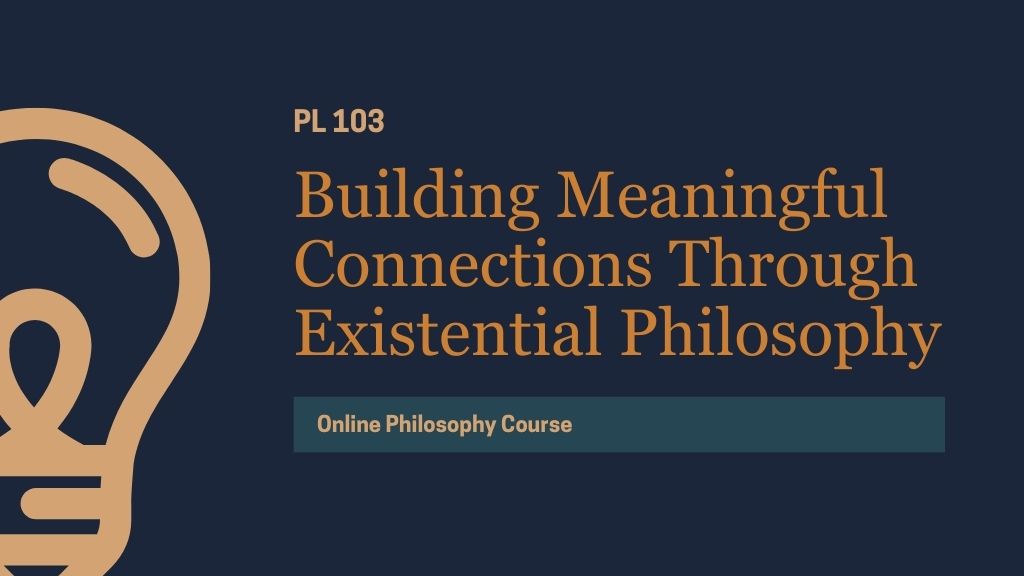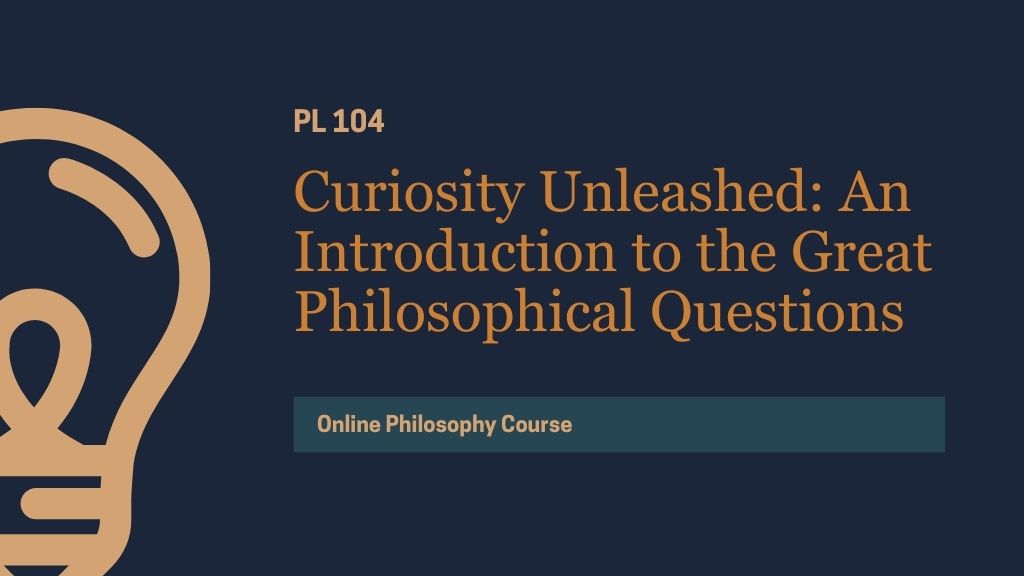Online Philosophy Courses
Discover your North Star. Pre-register for life-changing online philosophy courses.
Discover Purpose, Manage Stress, and Build Meaningful Connections
Why our philosophy school? If you simply want to take online philosophy courses, you can find them on the “big name” sites – Coursera, Udemy, Edx etc. But if you’re interested in a comprehensive philosophy of life program that focuses on philosophy as it relates to living a more meaningful life, finding purpose and happiness, and reconnecting with your emotions, then the PhilosophiesOfLife.org school and community is for you.
Our microlearning philosophy program provides tools to tackle life’s challenges, ignite intellectual curiosity, and foster personal growth.
Life Challenges Are Common
Many people encounter significant hurdles in their personal and professional lives. These challenges, if left unaddressed, can deeply impact overall well-being, relationships, and future opportunities. Do any of these resonate with you?
- Lack of Purpose or Direction – Without a clear sense of meaning or long-term goals, life can feel aimless and unfulfilling, leading to frustration and a loss of motivation.
- Difficulty Managing Stress – Struggling to juggle work, family, and personal responsibilities can cause burnout and mental exhaustion, affecting both your performance and peace of mind.
- Feeling Disconnected – Isolation from meaningful relationships or conversations often leaves a lingering sense of emptiness and a desire for genuine connection.
- Questioning Values – Living in a fast-changing world without solid grounding in your personal values can create confusion and ethical discomfort, leaving you feeling uncertain about critical decisions.
- Work-Life Imbalance – Being consumed by professional demands can steal attention from personal growth, causing feelings of stagnation and regret.
And that’s not all.
- Critical Thinking Gaps – The inability to analyze complex ideas critically or constructively may hinder communication, decision-making, or professional growth.
- Conflict Resolution Challenges – Struggles in managing and resolving disagreements can erode trust and damage important relationships over time.
- Emotional Resilience – Facing setbacks without the skills to stay optimistic and strong can leave you feeling stuck and discouraged.
- Curiosity but No Outlet – A thirst for intellectual exploration without structured opportunities can lead to a sense of unfulfilled potential and monotony.
If these issues feel familiar, it’s time to take action. Without addressing these pain points, life can become a cycle of stress, disconnection, and uncertainty. Imagine what your future could look like—not just surviving but thriving—when you begin to tackle these challenges head-on with the right tools and support.
“The happiness of your life depends upon the quality of your thoughts.”
– Marcus Aurelius
Our Philosophy of Life Program Can Help
Traditionally, opportunities to learn philosophy have been scarce — requiring years of expensive college or university education, or committing to lengthy 14-hour online courses that lack guidance and leave most people stuck before they even begin. This often leads to frustration and makes it harder to experience the profound benefits philosophy can bring, such as living a more authentic, purposeful, and fulfilling life. Our school offers a solution through engaging microlearning courses that enable you to grasp key philosophical concepts effortlessly and efficiently.
Microlearning is an often-overlooked method for studying philosophy that can vastly improve your progress as a learner. Grounded in the proven SMART goal framework, this approach allows you to steadily enhance your understanding through bite-sized, manageable lessons that fit seamlessly into your routine.
Each course in this program is structured into bite-sized lessons delivered over 12 weeks, perfectly suited for busy people. Every lesson includes a core video, journaling prompts, and an impactful passage from a key philosophical text—all carefully curated to spark insights and facilitate effective, actionable learning.
The Courses
Bradley Murray, Founder PhilosophiesOfLife.org

Register and Get Your Free Ebook Right Away
When you sign up, you’ll immediately receive our Ebook of philosophy quotes and journaling prompts, Meaning of Life: A Guide to Purposeful Living Through Reflection.
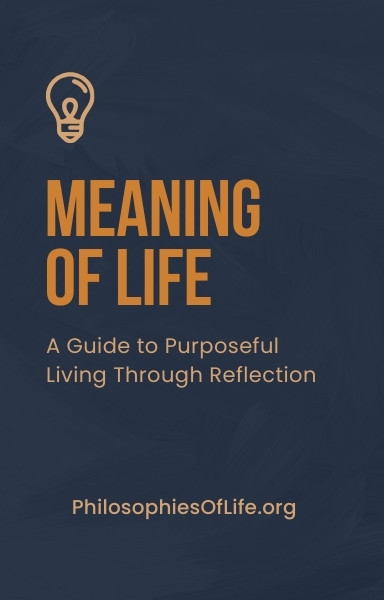
Don’t wait for clarity to find you. Take the first step toward a more meaningful, balanced, and fulfilling life. This program offers you a practical and engaging way to explore philosophy in manageable lessons, helping you apply timeless wisdom to modern challenges.
Sign up early to gain tools for stress, meaning, and connection.
Online philosophy courses: information and tips for online learners
Types of Online Philosophy Course Formats
The world of online philosophy courses offers diverse formats tailored to varying learning preferences and goals. Here are some different types of online philosophy course formats, including their characteristics and benefits.
Microlearning
Microlearning is an increasingly popular format that involves short, focused lessons designed to teach specific concepts or skills in under 10 minutes. These bite-sized modules are often available in video, text, or quiz formats and are optimized for mobile devices, making learning accessible on the go. Microlearning suits individuals looking to enhance specific skills without committing to lengthy courses. It also helps with retention by breaking content into manageable chunks that are easy to revisit as needed. This format is widely used in corporate training environments and personal skill development.
Self-Paced Courses
Self-paced courses are among the most flexible options in online philosophy learning. Learners can access pre-recorded video lectures, readings, and assignments and progress through the material at their own speed. This format is ideal for those balancing multiple responsibilities, as it allows them to work through the content around their schedules. However, it requires strong self-discipline and time management skills to stay on track without a fixed schedule.
Instructor-Led Courses
Instructor-led courses follow a structured timeline where lessons are delivered live through video conferencing or scheduled modules. Learners have opportunities to interact with instructors and peers, ask questions, and receive real-time feedback. This format mimics the traditional classroom experience and is well-suited for individuals who thrive in collaborative and structured settings. However, it requires committing to specific times for classes, which may be less convenient for some learners.
Hybrid Courses
Hybrid courses combine both online and in-person components, offering a blend of flexibility and hands-on learning. These courses may involve weekly virtual lectures supplemented by in-person workshops, labs, or group discussions. This format is effective for subjects that require practical experience, such as health sciences or engineering, and appeals to learners who benefit from a mix of physical and digital interactions.
MOOCs (Massive Open Online Courses)
MOOCs are designed to accommodate a large number of learners and are often offered by universities or educational platforms. These courses cover a wide range of academic and professional topics, and many are free or affordable. MOOCs typically include video lectures, quizzes, and discussion forums, ensuring accessibility for learners worldwide. However, because they cater to large audiences, individual support from instructors may be limited.
Benefits of Learning Philosophy Through an Online Course
Online courses in philosophy offer a wealth of benefits that make this timeless subject approachable for learners worldwide. Here are some of the primary advantages of pursuing philosophy through an online platform.
Flexibility in Learning
One of the most significant benefits of online philosophy courses is flexibility. Unlike traditional classroom settings with fixed schedules, online courses allow learners to study at their own pace and on their own time. This is particularly advantageous for people balancing professional and personal commitments. Whether you’re an early riser or a night owl, you can tailor your study schedule to suit your preferences, ensuring a more productive and enjoyable learning experience.
Cost-Effectiveness
Studying philosophy online is often more affordable than enrolling in a traditional on-campus program. Online platforms typically offer reduced tuition or even free courses through massive open online course (MOOC) providers. Additionally, students avoid the cost of commuting, housing, and physical textbooks, as most resources are available digitally. This cost-effectiveness makes philosophy accessible to a broader audience, democratizing education.
Personalized Learning Resources
Online philosophy courses often provide a wide variety of multimedia resources, including video lectures, e-books, discussion forums, and quizzes. These materials cater to different learning styles, whether you prefer visual aids, interactive tasks, or in-depth reading. Many courses also allow you to revisit content as needed, enabling you to absorb complex philosophical concepts at your own pace and develop a deeper understanding.
Improved Critical Thinking Skills
Philosophy is rooted in critical thinking, logic, and the exploration of challenging questions. An online philosophy course encourages learners to apply these skills rigorously through reflection on different viewpoints, which not only strengthens your reasoning abilities but also fosters open-mindedness.
Broad Applicability in Daily Life
The lessons learned in online philosophy courses often have practical applications in everyday life. Philosophy teaches us how to think critically about ethics, morality, and decision-making. By reflecting on these principles, learners can approach personal and professional challenges with clarity and integrity. Whether it’s resolving a workplace dilemma or making a life-altering decision, the critical thinking and analytical skills developed through philosophy are invaluable.
Encouragement of Lifelong Learning
The accessibility and variety of online philosophy courses make them an excellent entry point for lifelong learners. Many platforms offer courses for all levels, from beginner to advanced, allowing learners to continue building on their knowledge over time. The self-driven nature of online learning nurtures curiosity and encourages participants to explore related topics, such as psychology, history, or literature, fostering a continuous pursuit of intellectual growth.
Development of Communication Skills
Philosophical discussions often require articulating abstract ideas clearly and coherently. Online courses frequently include writing assignments and discussion prompts that allow learners to refine their written and verbal communication skills. These skills are transferable to various professional and personal scenarios, enhancing your ability to express ideas effectively and persuasively.
Accessibility
Perhaps one of the most important benefits of online philosophy courses is their inclusivity. They are typically designed to accommodate a wide audience, including students living in remote areas. Features like mobile-friendly platforms ensure that more individuals can benefit from the study of philosophy. This inclusivity helps to bridge the gap in educational opportunities.
Tips to Make the Most Out of Online Philosophy Courses
Here are some tips to help you maximize your learning experience in online philosophy courses.
Establish Clear Goals for the Yourself
Before starting an online philosophy course, take time to reflect on what you want to gain. Are you looking to better understand a specific philosophical school of thought, improve your critical thinking skills, or simply explore new ideas? Defining your goals will help you stay motivated and focused throughout the course.
Create a Dedicated Study Space
Having a quiet, comfortable, and organized study environment can greatly enhance your ability to concentrate. Make sure your study space is free from distractions, and consider keeping philosophy texts, notebooks, and other resources within reach. A consistent space can help you get into the proper mindset for learning.
Follow a Routine and Stay Consistent
One of the challenges of online learning is staying consistent with your studies. Set aside dedicated times each week to watch lectures, read assigned material, and complete coursework. Establishing a routine can help you manage your time and avoid last-minute cramming.
Engage Actively with the Material
Philosophy requires active engagement—simply passively watching lectures or reading texts is not enough. Take notes, underline key passages, and jot down questions or thoughts as you go through the material. This habit will not only help you retain information but also lead to a deeper understanding of philosophical arguments.
Seek Additional Resources
Philosophy often involves complex ideas that benefit from multiple interpretations and explanations. If you find a topic particularly challenging, seek out supplemental materials such as videos, podcasts, or books. Diverse resources can provide clarity and further enrich your understanding.
Practice Critical Thinking
Philosophy is built on reasoning and questioning, so take time to evaluate arguments critically. Challenge assumptions, identify logical fallacies, and construct your own perspectives on the topics discussed. Developing your critical thinking skills not only helps you in philosophy courses but also in other areas of your life.
Stay Open-Minded
Encountering new and sometimes opposing viewpoints is a staple of studying philosophy. Approach these ideas with an open mind, even if they contrast with your beliefs. Engaging with differing perspectives will help you broaden your understanding and appreciate the diversity of philosophical thought.
Manage Your Time Wisely
Balancing an online philosophy course with other responsibilities can be tricky. Break down readings, lectures, and assignments into manageable chunks and avoid procrastination. Using tools such as planners or apps can help you stay organized and meet deadlines.
Apply Philosophy to Everyday Life
Philosophy is not just an academic exercise—it has practical applications in daily life. Reflect on how the theories and ideas you study relate to personal decisions, societal issues, or moral dilemmas. Applying philosophy can deepen your appreciation for its relevance and utility.
Stay Patient and Persistent
Philosophy can be challenging—it deals with abstract concepts that may take time to fully grasp. Be patient with yourself and remember that confusion is a natural part of the learning process. Stay persistent, and over time, you’ll find that your comprehension and reasoning skills improve.
Leading Providers of Online Philosophy Courses
Below is a list of leading providers of online philosophy courses, along with descriptions of their services.
Coursera
Coursera is a platform that collaborates with universities and institutions around the world to provide online learning opportunities. Its philosophy courses cover various topics, such as ethics, metaphysics, and the philosophy of mind. These courses are taught by professors from institutions like the University of Edinburgh and Yale University. They often consist of video lectures, readings, quizzes, and peer-reviewed assignments. While some courses are free to audit, Coursera also offers certifications for a fee.
edX
edX is another prominent provider that partners with universities such as Harvard, MIT, and Stanford to offer philosophy courses. These courses explore diverse philosophical traditions, historical periods, and thematic areas such as social justice, political philosophy, and logic. Videos, interactive exercises, and comprehensive reading lists are commonly included in their course materials. Students have the option to take courses for free or pursue verified certificates at an additional cost.
Udemy
Udemy hosts a wide range of philosophy courses, created by independent instructors. The courses often focus on specific subjects such as ancient Greek philosophy, existentialism, or critical thinking. These courses are typically video-based and self-paced, allowing learners to progress at their own speed. Udemy operates as a pay-per-course platform, with prices varying depending on the course and instructor.
The Great Courses (via Wondrium)
The Great Courses offers philosophy content that can be accessed through its streaming service, Wondrium. Designed as lecture-based courses, topics range from the history of Western philosophy to more specialized areas like the philosophy of religion or bioethics. The instructors for these courses are typically university professors or experts in their fields. Content can often be purchased individually or streamed with a subscription.
FutureLearn
FutureLearn provides philosophy courses through partnerships with academic institutions, including the University of Exeter and the Open University. These courses are structured in a modular format, typically lasting several weeks, with tasks such as watching lectures, participating in discussions, and completing quizzes. Many of the courses are free to join, with the option to upgrade for additional features such as certificates.
Khan Academy
Khan Academy is a nonprofit educational platform that provides free learning content, including materials on philosophy topics. While less comprehensive than some other providers, its resources often introduce foundations of philosophy and related topics like logic and critical reasoning. The content is primarily accessible as video lessons, supplemented by exercises or practice questions.
Open Yale Courses
Open Yale Courses is a project by Yale University that provides access to full-length lectures from various undergraduate courses, including philosophy. These courses include video or audio recordings, transcripts, and reading assignments. Topics range from political philosophy to the philosophy of death, and access to these resources is completely free.
Harvard Online
Harvard Online offers several courses on philosophy in areas such as ethics, classical philosophy, and contemporary thought. These courses are available through platforms like edX or directly from Harvard’s own online initiative. They often include a combination of video lectures, required readings, and assessments. Some courses are free, while others require payment for enrollment or certification.
Stanford Online
Stanford Online provides courses and resources in philosophy as part of its broad range of subjects. The philosophy content includes offerings on topics such as moral philosophy, philosophy of science, and the works of influential thinkers like Descartes and Kant. These courses can be accessed through Stanford’s dedicated online learning portal, often featuring video lectures and assignments for enrolled learners.
Academic Earth
Academic Earth is a curated platform that links learners to free philosophy courses and lectures from various universities, including prestigious ones like MIT and the University of California, Berkeley. The courses cover themes like existentialism, logic, and political theory. Materials typically include video lectures and sometimes downloadable syllabi or reading lists.
